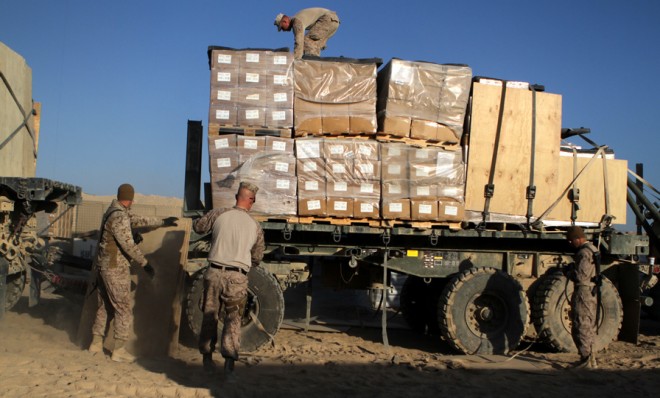The military is literally throwing away $7 billion in Afghanistan
The U.S. is simply abandoning tons of equipment because shipping it home would cost too much


The decade-long Afghan war has cost the U.S. a fortune. And withdrawing from the country, which still faces regular insurgent attacks, won't be a bargain, either.
Military planners have decided to leave behind $7 billion worth of equipment, The Washington Post reports, because it is no longer needed or simply is not worth the cost of shipping home.
The military, rushing to clear out on schedule at the end of 2014, has destroyed more than 170 million pounds of vehicles and other military equipment — including 2,000 of the Pentagon's 11,000 million-dollar Mine-Resistant Ambush Protected personnel carriers, which were rushed into service in 2007 to protect troops from roadside bombs.
The Week
Escape your echo chamber. Get the facts behind the news, plus analysis from multiple perspectives.

Sign up for The Week's Free Newsletters
From our morning news briefing to a weekly Good News Newsletter, get the best of The Week delivered directly to your inbox.
From our morning news briefing to a weekly Good News Newsletter, get the best of The Week delivered directly to your inbox.
The news was promptly branded as a shocking sign of waste in a flurry of angry tweets.
Even the glass-half-full view sounded bad.
The decision to shred giant trucks and scrap other material was actually the product of a debate on how to reduce waste. Some military leaders wanted to bring home more equipment, but they were overruled because the cost of shipping heavy equipment out of war-torn, landlocked Afghanistan was too high.
The Army has roughly $25 billion worth of equipment in Afghanistan, according to National Defense magazine. Lt. Gen. Raymond Mason, Army deputy chief of staff for logistics, said that since the estimated cost of shipping home and repairing the gear tops out at $14 billion, it makes sense to bring it back. "For an investment of $12 to $14 billion, we get $25 billion worth of stuff," Mason told National Defense.
A free daily email with the biggest news stories of the day – and the best features from TheWeek.com
Alan Estevez, assistant secretary of defense for logistics and materiel readiness, told National Defense that military officials will have to show an item is needed to get money to transport it out of Afghanistan. "If we don't need it for the future force," he said, "we are not going to pay the cost of bringing it back for resetting and parking it for some future unidentified need. Those costs are prohibitive."
Shipping, however, isn't the only price to pay. Ed Morrissey at Hot Air says "this may well be the best policy, at least economically speaking, but it looks bad."
The need to have that heavy equipment on the ground in an accelerated withdrawal schedule points to the fact that we have not in fact succeeded in Afghanistan in anything other than achieving a stalemate after 12 years of fighting.
We wouldn't be the first world power to end up leaving under those circumstances, and we can argue that we did better than the Russians and the colonial British in leaving on our own terms. The haste of our exit, as exemplified by our abandonment of billions in military resources, makes that argument a little tougher to make, and in that region, the image of weakness is not a good impression to make. [Hot Air]
Harold Maass is a contributing editor at The Week. He has been writing for The Week since the 2001 debut of the U.S. print edition and served as editor of TheWeek.com when it launched in 2008. Harold started his career as a newspaper reporter in South Florida and Haiti. He has previously worked for a variety of news outlets, including The Miami Herald, ABC News and Fox News, and for several years wrote a daily roundup of financial news for The Week and Yahoo Finance.
-
 The battle over the Irish language in Northern Ireland
The battle over the Irish language in Northern IrelandUnder the Radar Popularity is soaring across Northern Ireland, but dual-language sign policies agitate division as unionists accuse nationalists of cultural erosion
-
 Villa Treville Positano: a glamorous sanctuary on the Amalfi Coast
Villa Treville Positano: a glamorous sanctuary on the Amalfi CoastThe Week Recommends Franco Zeffirelli’s former private estate is now one of Italy’s most exclusive hotels
-
 How roadkill is a surprising boon to scientific research
How roadkill is a surprising boon to scientific researchUnder the radar We can learn from animals without trapping and capturing them
